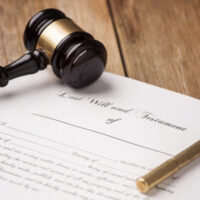Why Does a Will Need to Be Witnessed?

New York law requires a valid will to be signed in the presence of at least two witnesses. The witnesses must also sign the will, although they do not need to read it first or know its specific contents. The testator–the person making the will–must, however, declare the document they are all signing is in fact the testator’s will. It is also common practice for the testator and witnesses to sign a “self-proving” affidavit in the presence of a Notary Public.
You might wonder why these formalities are necessary. Put another way: What is the benefit of having witnesses for a will in the first place? The short answer is that if any legal contest arises involving the will, the witnesses can help prove the document is valid. After all, the testator is no longer around, but hopefully one of the witnesses will still be alive and available to testify in court if necessary.
Queens County Surrogate Temporarily Declines to Admit Will After Finding “Litany of Irregular Circumstances”
While most wills are admitted to probate without the need to call upon the witnesses, there are always exceptions that help to prove their continued necessity. Take this recent case from Queens Surrogate’s Court, Matter of Ramirez. This case involves a man (the decedent) who died in April 2018. Approximately two weeks before his death, the family attorney of the decedent’s wife drafted a will for him. The will was signed by the decedent in the presence of two witnesses, who also executed a self-proving affidavit. Another attorney notarized the affidavit but did not actively supervise the execution or have knowledge of the will’s contents.
After the decedent’s passing, his widow filed a petition to probate the will with the Surrogate’s Court. Other members of the decedent’s family objected to the will, however, alleging the document was not properly executed and that it was the product of fraud on the part of the widow. The Surrogate’s Court dismissed the fraud allegation but said the case could proceed to trial on the issue of proper execution of the will.
Indeed, the surrogate found there was a “litany of irregular circumstances in the drafting and execution of the instrument.” First, the attorney who drafted the will “neither met nor spoke with decedent” beforehand about his estate planning wishes. The attorney largely acted based on text messages received from the wife. Second, one of the witnesses testified she was “not really clear” whether or not the decedent actually wanted her to witness the signing of the will. The witness also admitted to unstapling the will and altering the date on the affidavit after the fact.
Speak with a New York Estate Planning Attorney Today
You should never sign a will that is not prepared according to your direct instructions to an estate planning attorney. A qualified Westchester County estate planning lawyer will also help to ensure that your will is properly executed and witnessed as required by New York law. If you need further advice or guidance in this area, please contact Meyer & Spencer, PC, today to schedule a consultation.
Source:
scholar.google.com/scholar_case?case=11661993562355787832
https://www.meyer-spencer.com/dealing-with-paternity-claims-during-the-probate-of-a-new-york-estate/
